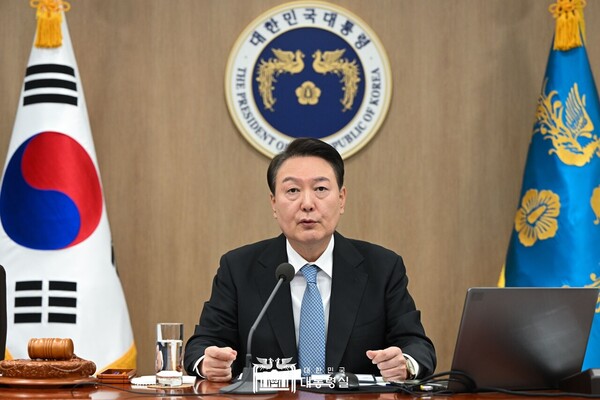President Yoon Suk Yeol instructed the government to accelerate efforts to make Korea a home of a globally competitive biotech cluster on a par with that in Boston, the U.S.
"We will actively consider creating a Korean version of the 'Boston Cluster' so that venture start-ups and young people can challenge and lead the biohealth field," Yoon said during a meeting with health experts on promoting the biohealth industry in Seoul on Tuesday. "We will improve and reorganize the system so that the biohealth industry can become globally competitive."
The biotech cluster in Boston, the U.S., is where multinational pharmaceutical firms such as Merck, Pfizer, Novartis, and Sanofi as well as law firms, accounting firms, consulting companies, and investment banking firms are clustered together, creating a massive biotech market.
A bio cluster is formed in Boston, USA. It is a place where bio companies such as Merck, Pfizer, Novartis, Sanofi, and Biogen, as well as law firms, accounting firms, consulting firms, and financial investment companies that support them, have gathered to build a huge bio industry market.
The Boston biotech cluster offers workplaces for over 1,000 pharmaceutical and biotech companies worldwide, providing over 74,000 jobs. It is the world’s largest bio cluster generating over $2 trillion worth of economic effect as of 2021.

Yoon emphasized that drastic innovation and investment should come first and that his government will make intensive investments so that Korea's biohealth industry can play better in the global biohealth market.
He specifically asked lawmakers to pass the pending Digital Healthcare Act promptly so that sensitive personal information can be pseudonymized and de-identified to protect private information and increase competitiveness in the biohealth industry.
In response, the Ministry of Health and Welfare announced strategies for creating a new biohealth market.
The strategies include five key tasks -- innovating data-based medical, health, and care services, vitalizing biohealth industry exports, strengthening R&D of advanced convergence technologies, nurturing advanced biohealth professionals and strengthening support for start-ups, and establishing laws, systems, and infrastructure.
For innovating data-based medical, health, and care services, the government plans to utilize personal medical data.
Notably, the government plans to begin the health information highway project, which provides personal health information in a standardized form to individuals and doctors, in June.
To vitalize biohealth industry export, the government plans to help the biotech sector create at least two new blockbuster drugs with annual sales of more than 1 trillion won within the next five years, and increase medical device exports by about twice the current level, to make Korea one of the top six biohealth powerhouses.
Regarding strengthening R&D of cutting-edge convergence technology, Yoon's administration plans to promote the development of a “RoseTTAFold” capable of predicting protein structures and designing antibodies to help with the rapid development of next-generation antibody drugs using data and artificial intelligence.
For nurturing advanced bio-health professionals and strengthening support for start-ups, the government plans to strengthen support for start-ups to foster 110,000 workforces specialized for the biohealth industry.
To establish laws, systems and infrastructure, the government plans to promote the enactment of the Digital Healthcare Act by establishing the "Digital and Bio-Health Innovation Committee."
Related articles
- JW Pharmaceutical's U.S. research unit moves to CIC in Boston
- Korean biotech firms scout foreign execs to accelerate global biz
- Korea goes all out to expand biohealth-related exports
- ‘Knock on US's door instead of sticking to barren Korean digital health market’
- Allison+Partners Korea eyes global promotion of ‘K-Pharma’
- President Yoon's US visit shines a spotlight on 21 pharma, biotech firms: A detailed analysis
- President Yoon Suk Yeol may declare end of Covid-19 on Thursday
- Gwacheon emerges as a new biocluster site as traditional pharmas converge

